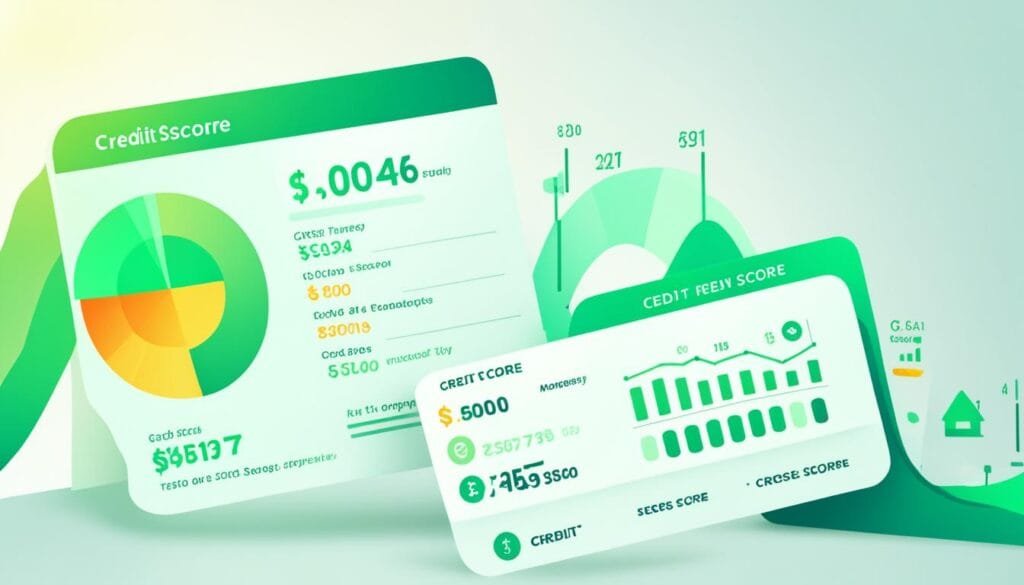When it comes to buying a home, having a good credit score is essential. But what if your credit score is less than perfect? Does that mean you’re out of luck? Not necessarily. Rent-to-own homes offer an alternative path to homeownership, even for individuals with bad credit.
A rent-to-own agreement allows you to lease a home for a set period of time before buying it. During this time, you can work on improving your credit score and saving for a down payment. This can be particularly helpful for individuals who have had credit issues in the past and need some time to get back on track.
The key to a successful rent-to-own agreement is understanding the process and knowing what to expect. In this guide, we’ll take a closer look at the ins and outs of rent-to-own homes, including how they work, the pros and cons, and how to avoid scams. We’ll also explore alternative options for individuals with low credit scores.
Key Takeaways:
- Rent-to-own homes allow individuals with bad credit to lease a home and have the option to buy it later.
- These agreements provide an opportunity to improve credit scores and save for a down payment.
- Rent-to-own homes have both advantages and disadvantages that should be carefully considered.
- It’s important to be cautious and do thorough research to avoid falling victim to rent-to-own scams.
- Alternative options, such as government-backed loans, may also be available for individuals with low credit scores.
What is Rent-to-Own?
Rent-to-own, also known as a lease purchase, is a legal contract between a buyer and a seller that allows the buyer to purchase a house with a future closing date, typically one to three years after the contract is signed. This is different from a lease option, where the buyer has the choice to buy the property but is not obligated to do so.
In a rent-to-own agreement, the renter pays a little extra in rent each month to help save for a down payment. This additional payment is known as rent credits or rent premiums. The renter also pays an upfront option fee, which is typically 1% to 7% of the purchase price and is nonrefundable. Both the rent credits and the option fee are held in an escrow account until the renter is ready to make a down payment and purchase the home. It’s important to note that even in a rent-to-own agreement, the renter still needs to qualify for a mortgage when the time comes to buy the home.
Comparison Table: Rent-to-Own vs. Lease Option
| Rent-to-Own | Lease Option |
|---|---|
| Buyer is obligated to purchase the property. | Buyer has the choice to buy the property but is not obligated to do so. |
| Renter pays extra in rent each month which goes towards the down payment. | Renter does not build equity through extra rent payments. |
| Rent credits or rent premiums accumulate as savings towards the down payment. | No rent credits are accumulated. |
| Renter pays an upfront nonrefundable option fee. | No upfront option fee is required. |
| Renter needs to qualify for a mortgage to purchase the home. | No mortgage qualification is necessary. |
| Buyer has a future closing date. | No future closing date is specified. |
Pros and Cons of Rent-to-Own Homes
Rent-to-own homes offer both advantages and disadvantages compared to traditional renting. It’s important to carefully consider these factors before deciding if rent-to-own is the right choice for you.
Advantages of Rent-to-Own Homes
- The opportunity to save for a down payment: One of the major advantages of a rent-to-own agreement is that it helps renters build up savings for a down payment. The structure of the agreement includes rent credits and an option fee, which accumulate over time and can be used towards the down payment when buying the home.
- Building credit: If you have a low credit score and are unable to qualify for a mortgage, a rent-to-own agreement can provide time to improve your credit. By making regular, on-time payments, you can demonstrate responsible financial behavior and work towards building a better credit score.
- Stability: Rent-to-own offers stability by allowing you to live in the home you love sooner. You won’t have to worry about house hunting or moving when the lease ends, providing a sense of security and peace of mind.
Disadvantages of Rent-to-Own Homes
- Risk of losing money: If you decide not to buy the house at the end of the rent-to-own agreement, you may lose the money you’ve paid towards the down payment. This can be a significant financial loss, so it’s important to carefully consider your commitment before entering into a rent-to-own agreement.
- Higher monthly costs: Rent-to-own homes often come with higher monthly costs compared to traditional rent. This is due to the additional costs associated with building equity and the option fee.
- Less flexibility: Rent-to-own agreements offer less flexibility if you fall behind on payments or change your mind about buying the house. Unlike traditional renting, where you can simply end the lease, breaking a rent-to-own agreement can have legal consequences.
It’s important to weigh these pros and cons carefully and consider your personal financial situation and long-term goals before committing to a rent-to-own home.

How to Find Rent-to-Own Homes
Rent-to-own homes were traditionally handled through agreements between individual owners and tenants. However, in recent years, real estate startups have popularized the concept and made it easier to find rent-to-own homes. Companies like Divvy Homes, ZeroDown, Dream America, and Landis specialize in connecting renters with rent-to-own opportunities.
To begin your search for rent-to-own homes, consider exploring the websites and services offered by these real estate startups. They typically provide a user-friendly interface that allows you to browse through available properties and evaluate their rent-to-own options. These platforms often provide detailed information about the properties, including their location, size, and features, as well as the terms and conditions of the rent-to-own agreement.
When utilizing these services, it’s important to research the companies thoroughly before proceeding. Reading customer reviews and checking for any recent news about them can give you valuable insights into their reputation and reliability. Additionally, it can be beneficial to consult a real estate attorney or title company to verify that the home you’re interested in is not in foreclosure and there are no issues with the property title.
“Real estate startups have revolutionized the way people find rent-to-own homes, offering a convenient and streamlined process for connecting renters with their dream home.”
By leveraging the services of real estate startups like Divvy Homes, ZeroDown, Dream America, and Landis, individuals have greater access and visibility into rent-to-own opportunities. These platforms simplify the search process, facilitating connections between potential buyers and sellers while providing essential information to support informed decision-making.
Comparison of Real Estate Startups
| Real Estate Startup | Key Features | Customer Reviews |
|---|---|---|
| Divvy Homes | Offers a wide range of rent-to-own properties with flexible down payment options. | 4.5/5 stars |
| ZeroDown | Enables renters to build equity in a home while allowing flexibility to buy or move out within 5 years. | 4/5 stars |
| Dream America | Provides a supportive home-buying process with personalized financial coaching and credit education. | 4/5 stars |
| Landis | Offers rent-to-own opportunities for individuals who may not qualify for a mortgage yet but have the desire to own a home. | 4/5 stars |
These real estate startups have cultivated positive customer experiences and received high ratings for their services. However, it’s important to remember that individual experiences may vary, and conducting further research specific to your needs is recommended.

Overall, real estate startups have revolutionized the way people find rent-to-own homes, offering a convenient and streamlined process for connecting renters with their dream home. By leveraging the services of these companies, individuals have greater access to a variety of properties and can make more informed decisions when it comes to renting with the option to own.
Questions to Ask Before Signing a Rent-to-Own Contract
Before committing to a rent-to-own contract, it’s crucial to gather all the necessary information and ask the right questions. Understanding the terms and conditions is essential to ensure a smooth and successful rent-to-own experience. Here are some important questions to consider:
Rent Premiums, Option Fee, and Purchase Price
Find out the specific details regarding the rent premiums, option fee, and purchase price. Understand how much extra you’ll be paying in rent each month, the upfront fee you need to pay to secure the option to buy the home, and the agreed-upon purchase price.
Rental Period and Extensions
Clarify the length of the rental period, typically ranging from one to three years, before you have the option to purchase the home. Additionally, ask about the possibility of extending the rental period if needed.
Penalties and Consequences
Understand the penalties and consequences if you miss a payment or fall behind on rent. Ask whether you’ll still have the opportunity to buy the home in such cases or if there are any additional penalties involved.
Changing Your Mind
Ensure you know the repercussions if you decide not to proceed with the purchase or change your mind about buying the house. Will you lose your down payment and deposit, or are there any other consequences?
Maintenance and Repairs
Discuss who is responsible for routine maintenance during the rental period and who will cover the costs of any major repairs if needed. Clarifying these responsibilities upfront will help avoid misunderstandings or disputes later on.
Credit Counseling and Education Programs
Check if the real estate company or landlord offers any credit counseling or education programs. These resources can be valuable if you’re looking to improve your credit score or gain financial knowledge during the rental period.
Asking these crucial questions will provide you with a comprehensive understanding of the rent-to-own contract and help you make an informed decision. Take the time to review the terms, ask for clarification if needed, and feel confident before signing any agreements.
How to Avoid Rent-to-Own Scams
While most rent-to-own homes are legitimate, it’s important to be aware of potential scams. Scammers can post bogus rent-to-own listings, tricking unsuspecting buyers. To avoid falling victim to these scams, it is crucial to take certain precautions and conduct thorough research before entering into any rent-to-own agreement.
Research Average Rental Rates:
Before committing to a rent-to-own property, it is essential to research the average rental rates in the area. Be cautious of listings that offer unusually low rental rates, as they may be an indication of a scam.
Verify Seller and Home Legitimacy:
“Verifying the seller and the home is an important step in avoiding rent-to-own scams,” says Jane Smith, a real estate expert. “You should always take the time to ensure that the seller is legitimate and that the home is in good condition for a rent-to-own agreement.”
To verify the seller and home legitimacy, consider the following:
- Confirm the seller’s ownership of the property through public records.
- Check if the seller is current on mortgage payments and property taxes.
- Request a home appraisal to assess its value.
- Conduct a home inspection to identify any potential issues.
These steps will help you avoid scams and ensure that you’re entering into a legitimate rent-to-own agreement.
Avoid Upfront Payments:
One common tactic used by scammers is to request upfront payments before any agreement is finalized. Never provide any upfront payments or personal information until you have thoroughly vetted the situation and confirmed the legitimacy of the seller and the property.
Report Scams:
If you come across a rent-to-own scam or suspect fraudulent activity, it is crucial to report it to the appropriate authorities. Contact your local authorities, state attorney general’s office, or the Federal Trade Commission to report the scam and protect others from falling victim to the same scheme.
Remember, staying informed and diligent is the key to avoiding rent-to-own scams. By conducting thorough research, verifying the seller and home, avoiding upfront payments, and reporting scams, you can protect yourself and make informed decisions when considering a rent-to-own property.
Alternatives to Rent-to-Own Homes
Rent-to-own homes are not the only option for individuals with credit challenges or limited savings. There are alternative paths to homeownership that can be explored. One option is to work with mortgage lenders who specialize in assisting borrowers with low credit scores. These lenders have programs and resources specifically designed to help individuals with less-than-ideal credit histories.
Another alternative is to consider government-backed loan programs. VA loans, for example, are available to qualified buyers and do not require a down payment. This can be a significant advantage for individuals with low credit scores or limited savings. Similarly, USDA loans also offer no down payment options, making them accessible to those who may not have significant funds upfront.
FHA loans are another viable alternative for individuals with lower credit scores. While FHA loans require a minimum down payment of 3.5%, they are generally more lenient in terms of credit score requirements compared to conventional loans. This makes them a practical option for those looking to become homeowners despite having a less-than-perfect credit history.
To determine the best alternative for individual circumstances, it’s crucial to research these programs and consult with mortgage lenders. These professionals can provide personalized guidance and help individuals find the most suitable financing options based on their specific credit scores and financial situations.
How Can Rent Reporting Services Impact Credit Scores in a Rent-to-Own Situation?
Rent reporting services can significantly boost credit scores now in a rent-to-own situation. By reporting on-time rent payments to credit bureaus, tenants can build positive credit history and improve their credit scores. This can provide more opportunities for financing and better terms on loans in the future.
Conclusion
Rent-to-own can provide a valuable opportunity for individuals who face credit challenges or limited savings but aspire to own a home. It allows them to save for a down payment while residing in their desired home, offering stability in the house-hunting process. However, before committing to a rent-to-own agreement, it is essential to carefully weigh the advantages and disadvantages, fully comprehend the terms, and remain vigilant against potential scams.
While rent-to-own is a viable path to homeownership, it is not the only option available. Government-backed loan programs, such as VA loans for qualified buyers with no down payment requirement, USDA loans offering no down payment options, or FHA loans with a minimum down payment of 3.5%, can serve as alternative avenues. It is advisable to explore these alternatives and consult with mortgage lenders to determine the best approach based on individual circumstances.
In summary, individuals should thoroughly evaluate their specific financial situation and goals to make an informed decision about pursuing their dream of owning a home. Rent-to-own can be a valuable tool, but considering the pros and cons, understanding the agreement, and being aware of scams are critical in ensuring a successful journey towards homeownership.
FAQ
What is Rent-to-Own?
Rent-to-own, also known as a lease purchase, is a legal contract between a buyer and a seller that allows the buyer to purchase a house with a future closing date, typically one to three years after the contract is signed.
What are the pros and cons of rent-to-own homes?
The advantages of rent-to-own homes include the opportunity to save for a down payment, the ability to build credit, and the stability of living in the desired home. However, the downsides include higher monthly costs and the risk of losing money if the house is not purchased.
How can I find rent-to-own homes?
There are real estate startups like Divvy Homes, ZeroDown, Dream America, and Landis that specialize in connecting renters with rent-to-own opportunities. Researching these companies and consulting with a real estate attorney or title company can help verify the legitimacy of the home and the seller.
What questions should I ask before signing a rent-to-own contract?
Some important questions to consider include the rent premiums, option fee, purchase price, rental period, penalties for missed payments, the possibility of extending the rental period, responsibility for maintenance, and who will pay for major repairs.
How can I avoid rent-to-own scams?
To avoid scams, it’s important to research and compare average market rents, inspect the seller and home for legitimacy, verify ownership, check mortgage and tax payments, have the home appraised, and not provide any upfront payments or personal information before thoroughly vetting the situation.
What are the alternatives to rent-to-own homes?
Alternatives to rent-to-own homes include working with mortgage lenders who specialize in borrowers with low credit scores and exploring government-backed loan programs like VA loans, USDA loans, and FHA loans that offer no or low down payment options.

